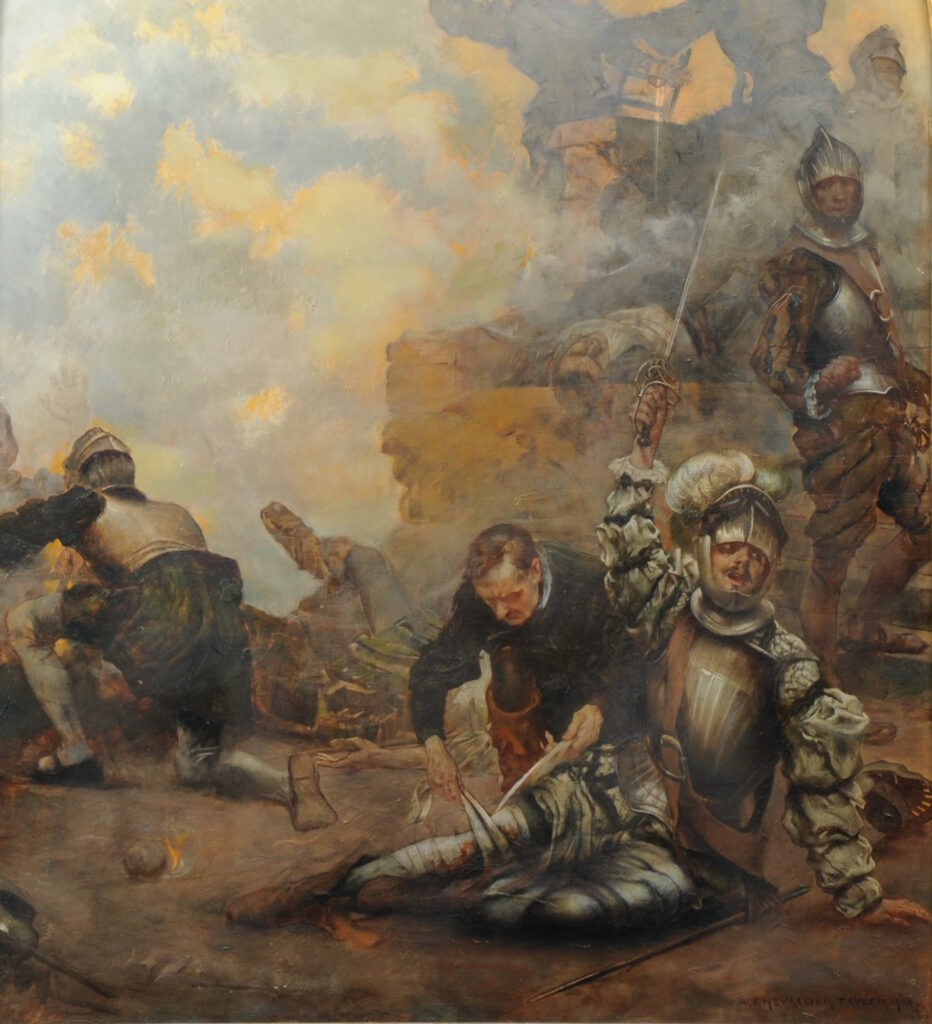
Chap. 2 The Cannon Ball: Pamplona
The attack did not come as a surprise. The Spanish army had been preparing for months for the arrival of French troops. When Ignatius came to live with the Viceroy of Navarre, preparations were already underway to fortify the towns of the province, especially the city of Pamplona. France had always wanted to incorporate Navarre into its own kingdom, but Spain wouldn’t give it up without a fight. Of course they’d need help if they were going to ward off the French since they didn’t have enough soldiers to mount a defense. In fact the viceroy fled the area in the spring of 1521, along with many other Spaniards, so only a small number of Spanish troops remained when the French arrived.

Thankfully Ignatius’s oldest brother Martín brought reinforcements to help his younger brother, but the town of Pamplona gave them a rude welcome. Spanish soldiers were viewed as foreign occupiers in the area of Navarre, and the town council refused to let the Loyola family have control of the fortress there. Furious at their refusal, Martín went back home with his troops, but Ignatius remained behind. He stubbornly refused to concede defeat and felt that his honor, as well as his country’s honor, was at stake.
Apparently Ignatius was the only one who felt this way. The rest of the Spanish troops were preparing to surrender the fortress to the French, but Ignatius gave a riveting speech to convince them otherwise. They were deeply moved by his courage and were willing to defend Pamplona to the death. In hindsight it’s hard to see why they would have listened to Ignatius. He wasn’t an imposing figure. He was on the shorter side for that time period, with a height of about five feet four inches. He was barely tall enough to wield the soldier’s sword, which was more than three feet long. But he burned with a passion that was contagious among everyone around him. Later in life he would have that same ability to persuade people to do impossible things. He had this charisma about him that made you want to do anything and to follow him to the ends of the earth, no matter what the cost.
But this time Ignatius was wrong. The Spanish were completely overmatched by the French, and his fellow soldiers were foolish to listen to him. The ones who fled initially were the smart ones. The French had 12,000 troops and dozens of cannons. The Spanish had a few hundred soldiers and little to defend their fortress with, but Ignatius and his comrades went into battle anyway. They were ready to fight until the bitter end, then suddenly Ignatius got hit by a cannonball. His fellow soldiers must have been stunned. Here was the man who just convinced them that they were unstoppable and could drive away an enemy no matter how formidable. Yet only a few hours into the fight their fearless champion was lying on his back and fighting for his life.
And they couldn’t even help him. The battle dragged on for a while longer as Ignatius lay there wounded. Even after the fight was over it took three days for the sides to finally agree to a ceasefire, forcing Ignatius to wait even longer to receive medical treatment. As he lay there in the fortress writhing in agony, he had a lot of time to think about what he had done. Maybe he didn’t care that his own life was in jeopardy. Dying in battle would make him a hero after all. But risking his fellow soldiers’ lives for a hopeless cause was selfish. There was no honor in getting other people killed just so you could fulfill your dreams. These and other thoughts swirled through his mind as he lay there on the ground, having nothing to do for hours and hours except think about the many mistakes he had made that day and throughout his life.
The three days were up, and both sides came to an agreement. Now they could finally attend to the wounded, and the French were kind enough to bandage Ignatius’s legs. They must have looked horrible, especially since the bone of his right leg was protruding out through the skin. Ignatius was in such bad shape that the French kept him immobile for two weeks until he was well enough to be carried home and get proper care from a doctor. When they did finally bring him home, the doctors discovered that one of Ignatius’s legs was not healing property. Maybe the original doctor didn’t set the broken bone correctly, or maybe it was dislocated while they were transporting him home. Either way, they had to break his leg again and reset it. The strong-willed Ignatius showed no emotion during the procedure. They didn’t have anything to numb the pain back then, so Ignatius felt everything when they broke his leg again and moved it back into its proper place. He never uttered a sound but only clenched his fists.
Reflection questions:
- Has something dramatic happened in my past that changed the course of my life? Do I know others who have had a cannonball moment that altered the course of their life?
- Ignatius dreamed of becoming a valiant knight and spent years pursuing that dream. What dream am I pursuing now? Will achieving that dream make me happy?
Click here for chapter 3
